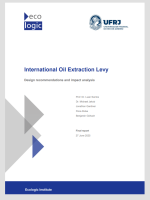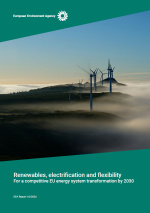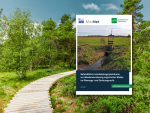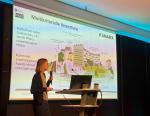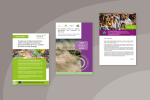Ecologic Institute Newsletter No 274 – July 2025
- Ecologic Institute Newsletter
International Oil Extraction Levy – Report
An international oil extraction levy could mobilize billions annually for climate action – in line with the polluter pays principle. This report explores the possible design of a CO₂-based levy on extracted crude oil, its revenue potential, and the associated social and political challenges. It focuses on macroeconomic impacts, household-level effects, political feasibility, and possible alternative approaches.
Renewables, Electrification and Flexibility – for a Competitive EU Energy System Transformation by 2030 – Report
Renewables, electrification and flexibility are key components to transforming the EU energy system. This report by the European Environment Agency systematically assesses progress in the electricity, heating and transport sectors towards the EU’s 2030 climate target. The findings show: hile the electricity sector is advancing, heating and transport are lagging behind. Achieving the 2030 targets will require accelerated action, targeted investment, and stronger policy momentum.
Delivering 2030 Climate Targets: Transparency and Policy Information Gaps of Member States' NECPs – Report
Are EU Member States' NECPs on track to meet 2030 climate targets? This new ECNO report critically examines the final plans of France, Ireland, Italy, and Sweden – revealing major gaps in transparency and policy information. Without a clearer vision of the policies and measures required, those targets are at risk. The report offers targeted recommendations to strengthen national planning and support a credible and effective path to a net zero economy.
Urban Nature Plans as a Strategy for German Municipalities – Report
Urban nature needs more than good intentions: it needs a strategy. This new BfN report explores ways in which German municipalities can develop Urban Nature Plans in line with the EU Biodiversity Strategy 2030: ambitious, integrated, and locally adaptable. It highlights the potential of the approach, overlaps with existing instruments, and insights from four municipal workshops. A practical guide highlights key entry points and underscores the need for targeted support to ensure effective implementation.
Nature's Integration in Cities' Hydrologies, Ecologies and Societies – NICHES Policy Briefs
After three years of collaborative research, the NICHES project has ended. In collaboration with partners and local stakeholders, the project explored how nature-based solutions (NBS) can enhance urban water resilience. Two new policy briefs distill key lessons on policy approaches that enable municipalities to effectively address combined sewer overflows (CSOs) using NBS and highlight how participatory processes can support the transition to sustainable urban water systems.
Unlocking Potential of Coastal Peatlands in Europe: Integration into National Restoration Plans – Policy Brief
Coastal wetlands are key allies for climate and biodiversity – if integrated properly. The new RESTORE4Cs policy brief demonstrates ways in which National Restoration Plans (NRPs) can unlock their full potential. It outlines strategic recommendations on monitoring, policy alignment, and nature-based climate solutions for healthier ecosystems, enhanced climate resilience, and stronger environmental synergies.
Taking Biodiversity into Account in Urban Development – Report
How can we systematically integrate biodiversity into urban development funding? This new publication by the Federal Agency for Nature Conservation offers practical guidance for municipalities – based on 52 integrated urban development concepts, expert interviews, and best practices. Three action fields illustrate how urban green, building-related measures, and planning processes can promote urban biodiversity. Ecologic Institute contributed key analyses and insights as project partner.
The Official Scope of Decision-making for the Rewetting of Organic Soils in Planning and Regulatory Law – Background Paper
Peatland restoration needs legal clarity – and the courage to make full use of existing leeway. A new background paper published within the MoorNet project outlines ways in which authorities can implement rewetting measures efficiently within current legal frameworks. It offers practical guidance on planning and permitting procedures, addresses legal trade-offs in nature conservation, and targets both public officials and private project developers – drawing on Ecologic Institute's legal expertise.
Planning and Approval of Peatland Conservation Projects in Lower Saxony – A Practical Guide
Restoring peatlands means protecting climate and biodiversity – but how can we implement in practice? This new guide supports project developers in Lower Saxony with planning, financing, and approval processes for peatland conservation. It provides a structured overview of project phases, planning elements, and funding opportunities, and targets public authorities, municipalities, associations, foundations, private actors, and agricultural enterprises.
Mapping Policy and Co-operate Initiative Landscapes for Systemic Change Towards a Nature-positive Economy – Report
How can we shift towards a nature-positive economy? This new report from the EU-funded GoNaturePositive! project analyses existing EU policies and cooperation initiatives, assessing their potential to drive restoration, systemic change, and nature-positive investments. The main analysis is complemented by sector-specific briefs on agri-food systems, blue economy, forestry, built environment, and tourism. It highlights key policy and collaboration levers for a resilient and nature-positive future - grounded in evidence, practical insights, and strategic recommendations.
A Circular Plastic Economy Should Account for all Societal Costs – Article
A truly circular plastic economy requires more than recycling. This new article, co-authored by Ecologic Institute, calls for a systemic shift. Fossil fuel and plastic production subsidies distort markets and block innovation. The article outlines key policy recommendations for the UN plastics treaty, including phasing out harmful subsidies, introducing a polymer production fee, and mandating a global phase-out of single-use plastics. A bold call to confront the true costs of plastic and reshape the system from the ground up.
Climate Change and Criminal Justice – Book Chapter
In the chapter "Climate Change and Criminal Justice", Dr. Stephan Sina, Senior Fellow at Ecologic Institute, examines why criminal law has only played a marginal role in climate change mitigation so far – and whether this should and could change. The contribution appears in the volume A Research Agenda for Environmental Crime and the Law, edited by Ricardo Pereira (Cardiff University) and Teresa Fajardo (University of Granada), recently published by Edward Elgar. Dr. Stephan Sina discusses the legal obstacles that stand in the way of criminalizing serious violations of climate protection laws and outlines possible future developments. The volume contains 14 contributions addressing current issues in environmental criminal law – ranging from ecocide and biodiversity crime to artificial intelligence.
Plan Digitally – Act Sustainably
Speech: Jenny Tröltzsch, Flora Dicke
How can digital planning support climate-resilient cities? At the AMAREX final event in Cologne, new approaches to stormwater management were presented - alongside an online tool to assess local impacts. Expert input, including active contributions from Ecologic Institute, interactive sessions and practice-oriented workshops showcased ways in which blue-green infrastructure can be effectively integrated into municipal planning.
Advancing a Circular, Regenerative and Competitive Bioeconomy – Contribution to the EC Public Consultation
As part of its contribution to the European Commission's public consultation "Towards a circular, regenerative and competitive bioeconomy", Ecologic Institute has actively supported the policy discourse through targeted publications and strategic engagement. Developed under the Horizon Europe projects SCALE-UP and 3-CO, these outputs reflect concrete regional experience and promote a transition that respects ecological boundaries, strengthens regional governance, and ensures social inclusion.
Voluntary Ecological Year
You want to get involved in environmental and sustainability issues, while gaining practical insights into office organization or science communication? Then apply for a Voluntary Ecological Year at the Ecologic Institute! Two exciting opportunities await you in the Orga and Communication & Events teams.
Contents
- Publications
- International Oil Extraction Levy – Report
- Renewables, Electrification and Flexibility – for a Competitive EU Energy System Transformation by 2030 – Report
- Delivering 2030 Climate Targets: Transparency and Policy Information Gaps of Member States' NECPs – Report
- Urban Nature Plans as a Strategy for German Municipalities – Report
- Nature's Integration in Cities' Hydrologies, Ecologies and Societies – NICHES Policy Briefs
- Unlocking Potential of Coastal Peatlands in Europe: Integration into National Restoration Plans – Policy Brief
- Taking Biodiversity into Account in Urban Development – Report
- The Official Scope of Decision-making for the Rewetting of Organic Soils in Planning and Regulatory Law – Background Paper
- Planning and Approval of Peatland Conservation Projects in Lower Saxony – A Practical Guide
- Mapping Policy and Co-operate Initiative Landscapes for Systemic Change Towards a Nature-positive Economy – Report
- A Circular Plastic Economy Should Account for all Societal Costs – Article
- Climate Change and Criminal Justice – Book Chapter
- Recent: Events
- Plan Digitally – Act Sustainably
- News
- Advancing a Circular, Regenerative and Competitive Bioeconomy – Contribution to the EC Public Consultation
- We are Hiring!
- Voluntary Ecological Year
